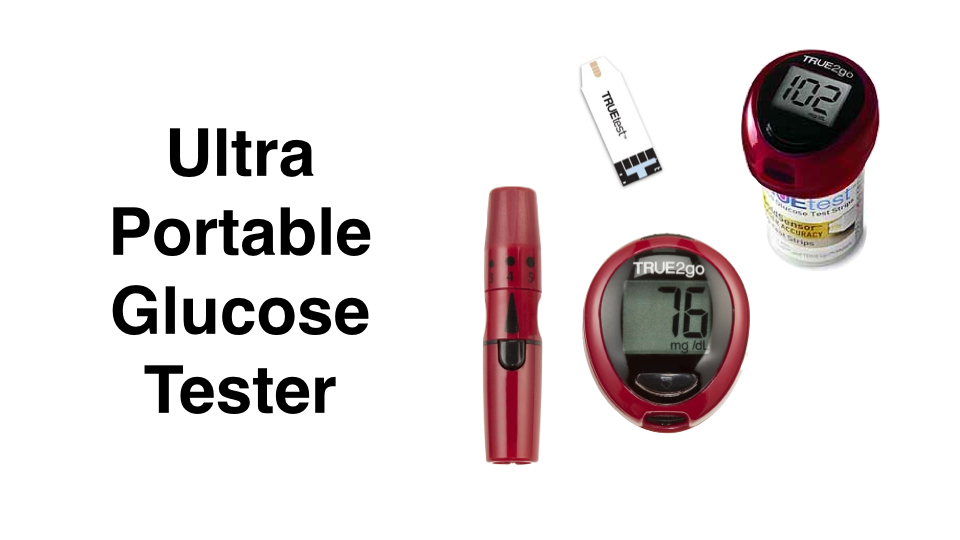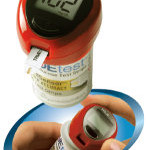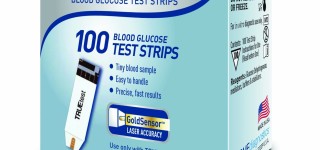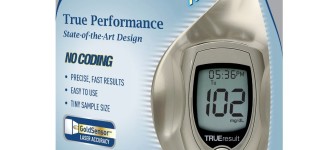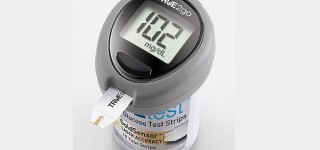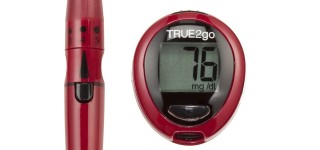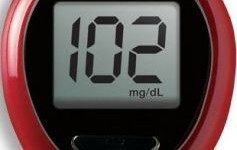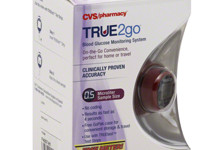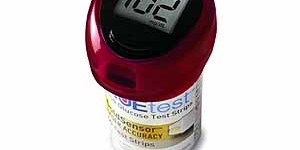Overview
CVS now offers a $7 ultra-portable TRUE2go glucose tester with quad electrode laser accuracy, 0.5 microliter sample size, and results in 4 Seconds. The same tester is available for about $15 on Amazon (without the travel case). [Buy on Amazon] The test strips can be purchased for $20 per 100, which is about 80% lower than some other comparable strips. [Buy on Amazon]
- The retail price of the tester is $10 at CVS. To get the $7 price you need to have a CVS rewards card (membership is free). Click here to read more about the CVS model of tester.
- Be sure to look for the model that requires only .5 (not 1.0) microliter samples and produces results in 4 seconds (not 10 seconds).
Benefits
- There are other testers on the market that require twice as much blood and up to 10 seconds for results.
- The unique design of this tester allows it to slip onto the cap of test strip container, making the entire package not much larger than the test strip tube container.
- The included lancing device is about half the height of others, making it the same height/length as the tester. It uses standard refills.
- Ten test strips are included.
- The included GoPack travel case looks like a tiny neoprene cozy. It holds the lancing device and test strip bottle together.
The Importance of Glucose Testing
According to the American Diabetes Association (ADA Fact Sheet PDF), over 10o million people in the United States are diabetic or pre-diabetic.
During an annual physical, it’s common to have blood work done that can help identify possible pre-diabetic indicators. However, annual checkups simply aren’t timely enough. So, even people not formally diagnosed as being diabetic can have problems with maintaining healthy blood glucose levels and should consider self testing.
According to research conducted by the Health Resource Group, there are two primary causes for the diabetes epidemic: (1) a typical diet high in refined sugar, fat, salt, and carbohydrates, (2) a sedentary lifestyles at home and in the workplace.
Lower Cost of Ownership
We’re all familiar with the low purchase cost of most cell phones and inkjet printers. Yet, the ongoing cost of ownership for these devices is high. The same is true for glucose testers. They are inexpensive to purchase, but costly to use. However, when you purchase a drugstore brand of tester like the CVS model mentioned here, the cost of replenishing test strips can be half the cost (or less) of name brand test strips.
Market Economic Forces
The cost (and potential profit) of diabetes is $245 billion per year. Healthcare providers and related healthcare industry businesses are scrambling for a piece of that money.
One of the most profitable industries is the business of selling small plastic test strips at huge markups. For example, the AlphaTrak 2 test strips are about $1 each (source). Presumably the strips cost about a penny to manufacture. For people testing 10 times per day, the cost is $300 per month ($3600 per year). Brands like Bayer, OneTouch, and Accu-Chek are also quite costly. Fortunately, high quality drugstore-brand strips can be purchased for as little as 20 cents per test strip. [Buy on Amazon]
Diabetes and the Health Insurance Industry
The partnership between the health insurance industrial complex and healthcare providers is well established. There’s a reluctance in the industry to provide products and services of a diagnostic nature for exploratory testing. So, despite their low cost, health insurance will not cover the cost of glucose test meters until you’ve been clinically diagnosed with diabetes. At that point, your health insurance will likely cover the cost of one test strip per day (to be used for a morning fasting test). So, any additional exploratory testing cost must be paid by the individual. Once a person becomes extremely insulin resistant, to the point of requiring insulin, shots, then finally the health insurance companies will help cover the cost of testing throughout the day. This “too little too late” approach to healthcare is what is exacerbating the epidemic of life threatening illnesses in the United States.
Photo Gallery
Below are photos of this model tester as well as some variations.

